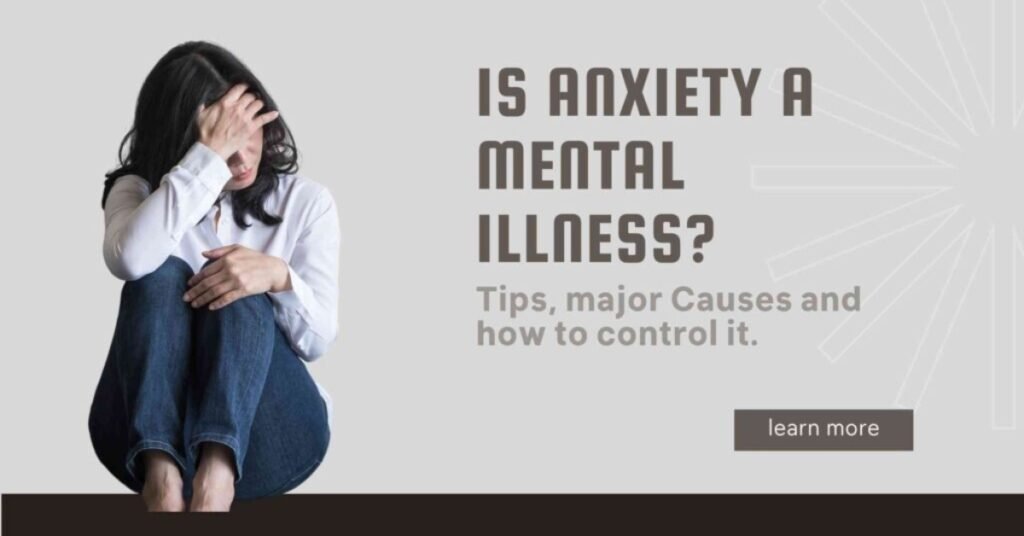Everyone’s Burning Question?
Is Anxiety a mental illness? Not exactly. It is, in fact, a survival mechanism that our ancestors passed on to us. The rush in our body tells us to get aware of the upcoming consequences and thus, we get alert. However, your anxiety could or could not turn into an illness. HOW, WHY, and WHEN?

Like allergies or immunity, anxiety is just a reaction to any given situation. It comes and goes like a swift blow of wind. When you face an unusual situation or a problem that you’re not ready to solve, you get anxious. This anxiety might help you at times too.
Ever thought about how you are so productive one day before an exam or before the due date of an assignment? The anxiety that you get before the deadline boosts your performance by giving you a mental and physical rush.
However, things turn blue when anxiety starts interfering negatively with your day-to-day life, relationships, productivity, and so on.
So, is the anxiety a mental illness? Medical sciences say that this kind of anxiety may be a symptom of other anxiety disorders. Some of these are listed below:
- Post-Traumatic Stress Disorder
- Obsessive Compulsive Disorder
- Attention Deficit Hyperactivity Disorder
- Anxiety Disorder
- Schizophrenia
Major Causes Of Anxiety

The causes of your anxiety may depend on the type of situation that often gets you nervous such as shifting to a newer place, meeting new people, going out in the crowd, certain noises/voices, or triggers.
‘Trigger’ is a word frankly used over social media for being upset while it’s not right. It’s an extreme form of reaction to something. If casually occurring things trigger you, then you should check up on yourself and seek professional help (even if you’re fine, it’s okay to seek help).
Our thoughts or sometimes the loop of worries play a major role in causing anxiety. One such loop may look like this:
“Today I have woken up late. Now, how will I spend the rest of the day after ruining my morning? I should have woken up early. My day won’t be enough productive anymore. Oh gosh! How badly I wish I could reverse the time and wake up early!”
You need to calm down, buddy. We have all been there.
Here, you can see that waking up late didn’t worry you as much as overthinking about it did. It is your reaction to it that made you feel worse.
And so, we get the rough underlying idea of anxiety- ‘A situation isn’t the real cause of any anxiety problem, but the reaction to it sure is.’ Hope you have found the answer to your question “is anxiety a mental illness?“.
How To Control Overwhelming Anxiety

Since anxiety is not an illness but becomes a problem when in excess, there can be ways to handle it.
You can’t determine if you’ll never catch a cold or never fall sick after getting medicine once. The only solution is the way you learn to deal with these and other unrelated problems over time. One-time ups or one-time downs don’t tell you how good your control is. Conversely, reflecting on the accommodated ups and downs over time can help you understand your controlling strength better.
Remember that Rome was not conquered in one single day. Not only laughable but also upsetting days are a part of normal life.
Ways To Stop Your Anxiety From Becoming An Illness

There are multiple ways to stop your anxiety from turning into an illness. Most of them include shifting your perspective to an entirely different way. Here are some key pointers you can take help from:
1. When facing an unusual or tough situation – Tell yourself that this is teaching you something and could be a chance for you to get out of your comfort zone. Who knows if you could discover your comfort in small and difficult situations?
2. When the loop of negativity goes on and on – You need to find that hopeful crack in the loop and jump the hell out of it! It’s easy to get stuck in a chain of thoughts even though you know it is harmful, however, it’s also important to connect with your conscience and leave those thoughts behind.
3. When receiving strong criticism – Stay firm on your take if you initially felt that you’re surely not wrong but also show flexibility in conversation. It could be an eye-opening event for you to get out of the box!
4. When your people don’t understand you – It is okay to let them. Not every person can understand you always. Whose belief you need the most, in the long run, is you and yourself, friend. Allow others to take their time. Those who are willing will eventually come around.
5. When the mountain of failures starts pushing you down – Just know that Sir Thomas Edison didn’t stop after 10,000 fails. No age is too late to start over (that is if you wish to start over again). Linger longer over the fact that you tried because trying is better than doing nothing.
How To Manage Your Anxiety Over Time

Controlling your anxiety comes up when you’re immediately met up with a certain situation and you know that it’ll grow your anxiety to ‘out of the bar’ heights. Then the above-mentioned pointers can come into help, then and there.
Meanwhile, managing anxiety is about looking at the larger picture. If you have sought help from an expert or maybe trying to figure it out yourself, you want to manage your anxiety to cope better.
Tips To Help You Manage Your Anxiety
Whether you have an anxiety disorder or facing a massive issue with your reaction capacity, then you can try the below-listed methods to get better at it:-
- Read books related to mental health and issues

There are lots and lots of books on this. For starters, you can check this one out – “The Subtle Art of Not Giving A F*uck” by Mark Manson.
It’s a mind-blowing and practical book on handling anxiety.
Or you could go for these:
-
- Thinking, Fast and Slow by Daniel Kahneman
- The Power Of Your Subconscious Mind by Dr. Joseph Murphy
- Mindset by Dr. Carol S. Dweck
- The First 90 Days by Michael D. Watking
- See a certified psychologist or go to counseling

It’s taboo to see a psychologist (or a ‘shrink’ in slang language) these days. People often step back from seeing one instead of giving the experience a try. Psychologists are practicing experts who have in-depth knowledge of anxiety illnesses and disorders (both of them have different origins). This would probably be the best thing you’ll do to stop your anxiety from eating you.
- Talk it out

“Man up, be strong.”
It certainly doesn’t work this way always. Does it? What would you do if, deep inside, you know that your loved one is suffering but hiding it from you?
Exactly! You’ll try reaching out to them and ask them to speak up if they feel comfortable.
The same goes for you too. You’ll never get weak for speaking up for yourself and talking through your problems with someone you trust.
- Learn different coping mechanisms (and pick your favourite)

Some people find comfort in food while some find it in sleep. This is their ‘coping mechanism’. It helps them to handle a situation that gives them a crippling amount of anxiety. While some actions are natural like shouting, throwing things, or cursing, they DO NOT count as a coping mechanism.
In some cases, people choose psychologists to help them through CBT (cognitive behavioural therapy). It is best to take your time to reflect and be self-aware.
Last but not least, you’ll need to know that you are not alone. Anxiety isn’t always your enemy. We can fight any condition and prevent it even if we can’t find a permanent cure for it. We have got this together!
Let’s End With a Quote
“Life is ten percent what you experience and ninety percent how you respond to it.”
― Dorothy M. Neddermeyer
Read More:
FAQs
1. Is anxiety a disability?
Ans. Anxiety is not a disability, it’s simply an emotional reaction. But if your psychologist can be convinced that this same anxiety controls your productivity then it can be termed a disability.
2. Would anxiety stop me from working?
Ans. Most times, you can’t work with anxiety. This is because being anxious causes your nervous system to go haywire and your shakiness can induce problems where your focus is needed. So you might need to pace it down a bit and then go to work.
3. What does anxiety feel like?
Ans. When you’re anxious, your breathing may alter, your heart rate may go high, limbs may start shaking and random headaches or stomach aches may occur. Besides these physical symptoms, worrying thoughts and stress may also occur as a feeling.
4. What are the long-term effects of anxiety?
Ans. In the long term, anxiety can cause several medical complications like gastrointestinal issues, heart problems, headaches or migraine, and sleeping issues like insomnia. According to doctors, anxiety should not control your life for a long time and should be managed through self-work or therapy.



